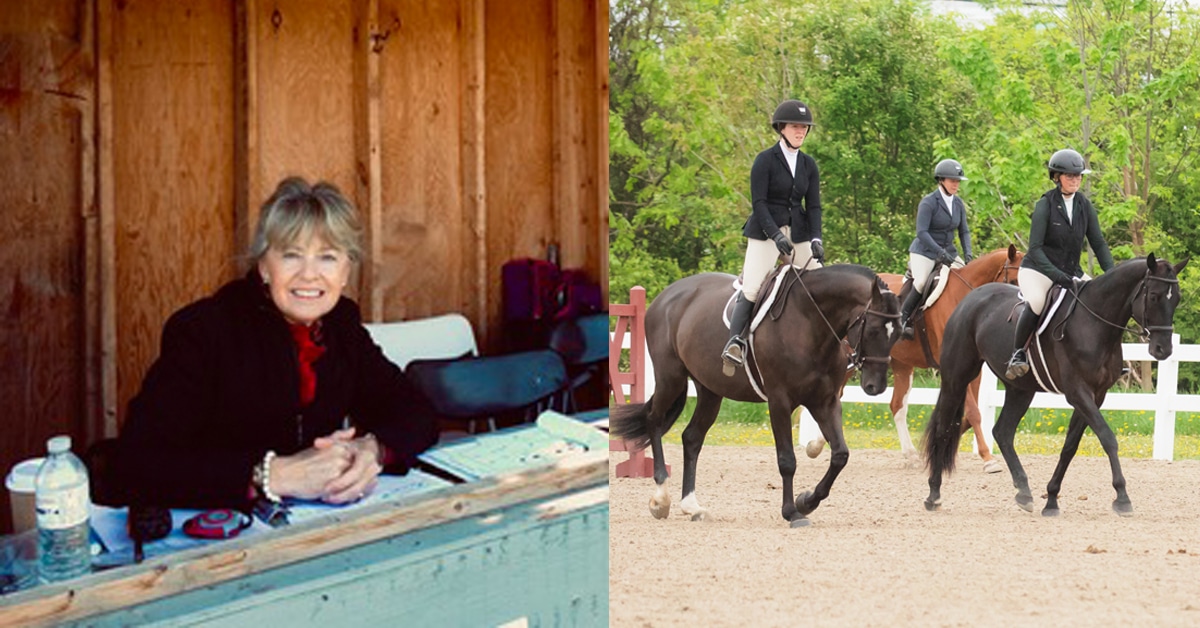Dr. Alan Manning has been the Dressage and Para-Dressage team veterinarian since the 2011 Pan American Games in Guadalajara, Mexico. He will also accompany the Eventing team to the World Championships being held next month in Italy.
Born on Prince Edward Island, Alan grew up riding and showing horses and running horse shows on his parent’s farm. He decided to move to Ontario to attend vet school and, on graduation, was offered a job at Armstrong Brothers, Ontario’s top Standardbred breeding and racing farm.
“I started out doing racing and breeding work, but with my horse show background I started to do more and more of that and it just took off, so that’s where I ended up,” said Alan of his career’s trajectory. “Now I specialize in sport horses, rehabs, injuries, and how to get your horse in the best condition to compete.”
Alan has a practice serving thousands of clients in Ontario, and gives high praise to the four vets and 15 staff who run the business while he’s away with the team.
“To be a veterinarian and do this you have to have really good support staff at home,” said Alan, who was gone for two months last year working for the Canadian Team for the lead-up and during the Tokyo Olympics. “I spend a lot of the time on the phone with them while I’m away going back and forth to make it all work.”
Alan has been with the Dressage and Para-Dressage teams since they started training camp in Randers which is about an hour and a half from the Championship venue in Herning. On-site, Alan arrives early in the morning to do his daily assessments of each horse, making sure that there are no changes.
“The grooms are my biggest support staff at this end; they let me know that everyone was good through the night and at night check and there is nothing different in the morning. Little issues we do have on the go we’ll check on and see how things look in the morning. We try to jog the horses almost every day to make sure we didn’t miss anything or something didn’t happen with them overnight that we didn’t know about so we can stay on top of whatever needs to be done. I try my best to go every time that horse is exercised so that I can watch in case something different pops up so we can get on it as soon as we can.”
Competition drug testing prevents the use of most medications, but there are still many options that Alan has at his disposal including oral joint supplements as well as some herbs.
“They are allowed certain herbal medications, they are allowed vitamins, they are allowed fluids,” noted Alan. “We use herbs like Traumeel and Zeel which are anti-inflammatory herbs that humans use as well. Most of the horses here are on gastric supplements such as GastroGard to help prevent ulcers.”
In addition to Alan’s work, the grooms also monitor the horses and are responsible for taking their horse’s temperature twice a day and uploading in into the FEI’s app.
“Each horse has their own app that they put the temperatures into which has to be done three or four days before the competition and then throughout the competition,” explained Alan. “They also have to put in where the horse has been and if there are any changes with the horse as far as condition. [The FEI is] worried about coughing, snotty nose and anything that would relate to a respiratory issue. They are worried about a contagious type of condition that can pop-up.”
If any issues do come up, there is a full clinic set up on site that is free to use. There haven’t been any major issues in Herning, but Alan recalls a time in Tokyo when one of the grooms arrived in the morning to find a stall covered in blood after the horse had split its head open.
“That was a little tense when you have to put that back together,” recalled Alan of the incident. “The horse’s welfare is the most important thing, but if we can still treat the horse and get it ready for competition, we do the best we can to do that.”
Alan will often travel with the horses when they fly from Canada to Europe, but that wasn’t necessary this time as two horses were already here and the others came earlier. Coordinating those flights is often a challenge, as when travelling to the Olympics each team was only allowed one person to accompany their horses, although they are supported by the professional grooms employed by the shipping agents. Countries on the flight will discuss who they want to send and negotiate groom space versus vets on board.
“We have to be responsible for everyone there,” noted Alan of the stress of being one of two vets on a plane full of Olympic-calibre dressage horses. “The Olympics don’t start until we land because we are all one team getting those horses there. We are helping everybody. The grooms are helping each other out. One horse acts up you need somebody to be with that one, but the other three horses are there too, so they all help out.”
There are certainly valuable professional perks to working with the veterinary team at top international competitions.
“You get to know a lot of the other veterinarians because they are on the same teams. You see them here and chat with them, learn different things, ask them a question, show them an X-ray. It’s a lot of high-powered people here all of a sudden for a week. You can learn a lot.”
Despite being part of a team, the workload is heavy and can be stressful. “They are long days. You are always worried about the horses because if something does go wrong, you need to be right on top of it.”
The Latest










